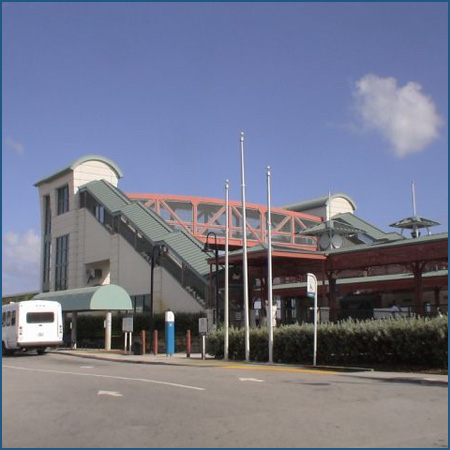Delray Beach, FL (DLB)
Delray Beach traces its origins to the construction of the Orange Grove House of Refuge in 1876, named for a grove of sour oranges and meant to provide refuge to shipwreck survivors.

Amtrak/Tri-Rail Station
345 South Congress Avenue
Delray Beach, FL 33444
Annual Station Ridership (FY 2024): 13,202
- Facility Ownership: Florida Department of Transportation
- Parking Lot Ownership: Palm Beach County
- Platform Ownership: Florida Department of Transportation
- Track Ownership: Florida Department of Transportation
Todd Stennis
Regional Contact
governmentaffairsnol@amtrak.com
For information about Amtrak fares and schedules, please visit Amtrak.com or call 1-800-USA-RAIL (1-800-872-7245).
The current Amtrak stop in Delray Beach consists of a platform with a shelter at the Tri-Rail intermodal station. This facility opened in 1989 as a replacement for the Seaboard Air Line station and was remodeled between 2004 and 2006 to accommodate a second track.
Delray Beach began with the construction of the Orange Grove House of Refuge in 1876, so named for a grove of mature sour oranges that were found at this site. The refuge provided was for shipwreck survivors on that Atlantic-facing beach.
Further settlement began around 1884 when African-Americans from the Florida panhandle bought land inland from the Orange Grove House of Refuge and began farming. By 1894 the community of 250 was large enough to require establishment of the first school in the area. In that year, William Seelye “Steelcut” Linton, postmaster from Saginaw, Michigan, bought a tract of land west of the Orange Grove House of Refuge and began selling plots to create a farming community, which he named after himself. In 1896, Henry Flagler’s Florida East Coast Railroad extended south from West Palm Beach to Miami and created a station stop at Linton.
A hard freeze in 1898 proved a major setback to this small farming community, and many, including Linton, moved away. In 1901 the name was changed to Delray, after a Detroit neighborhood, which in turn was named after the Mexican-American War’s Battle of Molino del Rey. The state of Florida chartered Delray as an incorporated town in 1911, the same year that pineapple and tomato canneries came to the town. Pineapples became the primary crop in the area—thus the naming of the Pineapple Grove neighborhood located today near downtown Delray Beach. However, draining of the Everglades west of Delray Beach in the 1920s brought pineapple cultivation to a close, as the lower water table made it much harder to grow them. The 1920s Florida land boom brought the city further growth.
The town of Delray was separated from the Atlantic Ocean beach by the Florida East Coast Canal, now part of the Intracoastal Waterway. In 1923 the area between the canal and the beach incorporated as Delray Beach; in 1927, Delray and Delray Beach merged into one civic unit, called Delray Beach, which it remains today.
This small city has had a quiet history. Today the downtown has been renovated and shops and businesses brought to the historic town center by the Delray Beach Tennis Center, which has hosted several major international tennis events, such as the 2005 FedEx Cup, the Davis Cup, the Millennium ITC, and the Chris Evert/Bank of America Pro-Celebrity tourney.
Platform with Shelter
Features
- ATM not available
- Elevator
- Payphones
- No Quik-Trak kiosks
- No Restrooms
- Unaccompanied child travel not allowed
- No vending machines
- No WiFi
- Arrive at least 30 minutes prior to departure
Baggage
- Amtrak Express shipping not available
- No checked baggage service
- No checked baggage storage
- Bike boxes not available
- No baggage carts
- Ski bags not available
- No bag storage
- Shipping boxes not available
- No baggage assistance
Parking
- Same-day parking is available; fees may apply
- Overnight parking is available; fees may apply
Accessibility
- Payphones
- Accessible platform
- No accessible restrooms
- No accessible ticket office
- No accessible waiting room
- No accessible water fountain
- Same-day, accessible parking is available; fees may apply
- Overnight, accessible parking is available; fees may apply
- No high platform
- No wheelchair
- Wheelchair lift available
Hours


 Amtrak established the Great American Stations Project in 2006 to educate communities on the benefits of redeveloping train stations, offer tools to community leaders to preserve their stations, and provide the appropriate Amtrak resources.
Amtrak established the Great American Stations Project in 2006 to educate communities on the benefits of redeveloping train stations, offer tools to community leaders to preserve their stations, and provide the appropriate Amtrak resources. Amtrak is seizing a once-in-a-lifetime opportunity to transform rail and Retrain Travel. By modernizing, enhancing and expanding trains, stations and infrastructure, Amtrak is meeting the rising demand for train travel. Amtrak offers unforgettable experiences to more than 500 destinations across 46 states and parts of Canada. Learn more at
Amtrak is seizing a once-in-a-lifetime opportunity to transform rail and Retrain Travel. By modernizing, enhancing and expanding trains, stations and infrastructure, Amtrak is meeting the rising demand for train travel. Amtrak offers unforgettable experiences to more than 500 destinations across 46 states and parts of Canada. Learn more at